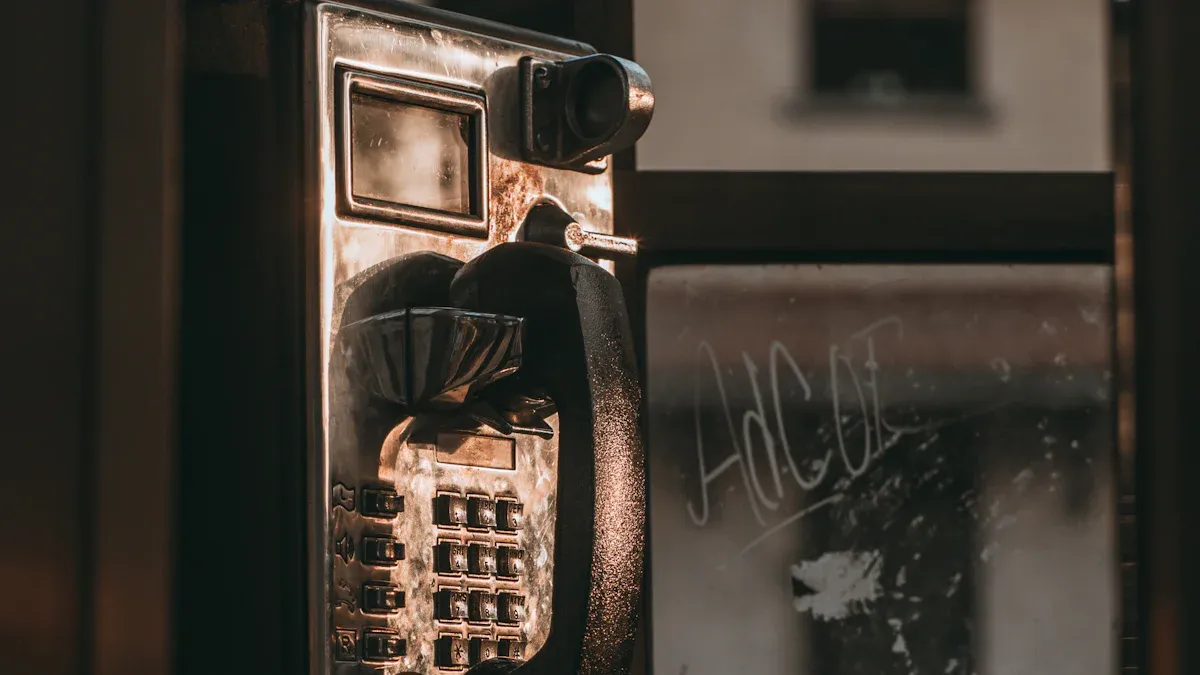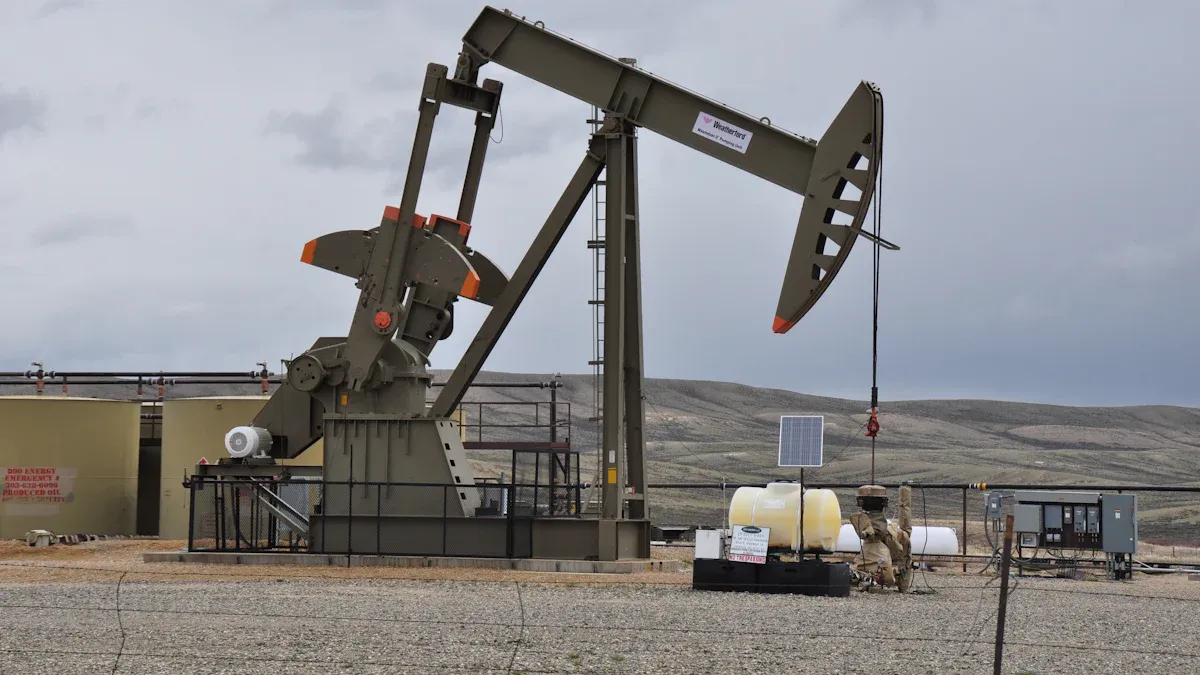
In challenging industrial settings, reliable communication is absolutely essential. It ensures operations continue smoothly and keeps everyone safe. Selecting the perfect industrial telephone handset becomes paramount. This choice prevents communication failures. A robust industrial telephone handset helps you maximize uptime and maintain productivity.
Key Takeaways
- Regular phones fail in tough industrial places. They cannot handle dust, water, or extreme temperatures. Industrial handsets are built strong for these conditions.
- Choosing the right industrial phone means looking at its features. It needs to be durable, resist water and dust (IP rating), handle extreme temperatures, and cancel noise.
- A good industrial telephone handset keeps workers safe and operations running smoothly. It helps avoid costly communication breakdowns and lost work time.
The Critical Need for a Robust Industrial Telephone Handset
Understanding Environmental Threats to Communication
Industrial environments are truly challenging places. They often contain dust, dirt, and moisture. Extreme temperatures, both very hot and very cold, are common. Corrosive chemicals can also pose a threat. Machines create constant vibrations and impacts. These harsh conditions quickly degrade regular communication devices. They can make signals unclear or stop them from working entirely. Imagine trying to talk over loud machinery with a phone full of dust!
The High Cost of Communication Downtime
Communication failures are more than just an inconvenience; they are incredibly expensive. When communication breaks down, operations can grind to a halt. This leads to significant financial losses.
| Industrial Sector | Average Hourly Downtime Cost |
|---|---|
| General Manufacturing | Around $260,000 |
| Automotive Manufacturing | Exceeds $2 Million |
| Energy and Utilities | Averages $2.5 Million |
| Oil and Gas | Around $500,000 |
| Defense and Government | Above $5 Million |
These numbers clearly show how quickly costs can escalate. Beyond the financial impact, communication downtime also creates serious safety risks for personnel. It significantly reduces overall productivity.
Why Standard Handsets Fail in Industrial Settings
Standard consumer phones simply cannot withstand the demands of industrial work. They are not built for the constant abuse found on a factory floor or a construction site. Their plastic casings break easily. Dust and water quickly get inside. The microphones and speakers do not perform well in noisy environments. An ordinary phone quickly becomes useless in such conditions. This is precisely why a purpose-built Industrial Telephone Handset is so crucial. It ensures clear, reliable communication where it matters most, keeping everyone connected and safe.
Key Features for Your Industrial Telephone Handset Selection
Choosing the right communication tool for tough jobs means looking closely at its features. A good industrial telephone handset is not just a phone; it is a lifeline. It needs specific qualities to survive and perform in harsh conditions.
Durability and Material Construction
The materials used to build an industrial telephone handset are very important. They determine how well the device can handle daily abuse. Manufacturers use special materials to make these handsets tough.
- High Impact Glass fibre-reinforced polyester often forms the main housing. This material resists strong hits.
- High Impact Thermoset Resin Compound makes up the handset itself. It can take a lot of wear and tear.
- Corrosion-resistant cast aluminum alloy creates weatherproof cases. This material protects against dust and moisture. It also offers high mechanical strength and strong impact resistance. Thick aluminum alloy die-casting material helps meet explosion-proof needs.
- High-strength ABS material is another choice. Engineers design it for extreme durability. It resists physical damage, corrosion, and even vandalism.
- Reinforced ABS or polycarbonate also offers great impact resistance and durability. These materials adapt well to tough industrial places.
Ingress Protection (IP) Ratings Explained
IP ratings tell you how well a device protects against solids and liquids. The first number shows protection from solids like dust. The second number shows protection from liquids like water. For industrial settings, you often see IP67 or IP68.
| Feature | IP67 | IP68 |
|---|---|---|
| Dust Protection | Complete (Level 6) | Complete (Level 6) |
| Water Depth | Up to 1 meter | Beyond 1 meter (manufacturer specified) |
| Immersion Time | Maximum 30 minutes | Continuous (manufacturer specified) |
| Cost Factor | Lower manufacturing cost | Higher manufacturing cost |
Both IP67 and IP68 ratings offer full protection against dust, sand, and dirt. They also provide excellent protection against splashes. The main difference is how much water submersion they can handle. For example, an IP67 device can go into fresh water up to 0.5 meters for 30 minutes. An IP68 device can go deeper, like 1.5 meters for up to an hour. These guarantees usually apply to non-corrosive liquids like fresh and salt water.
Temperature and Chemical Resistance
Industrial environments can have extreme temperatures. Some places get very hot, while others get very cold. An industrial telephone handset must work reliably in these conditions. It should not melt, crack, or stop working. Many industrial sites also use harsh chemicals. The handset’s materials must resist these chemicals. This prevents corrosion and damage, keeping the device functional and safe.
Impact and Vibration Resilience
Machines in factories and construction sites create constant vibrations. Accidental drops and bumps are also common. A good industrial handset must withstand these physical stresses. Several industry standards ensure devices can handle impact and vibration:
- MIL-STD-810: This military standard outlines tests for environmental conditions. It includes specific vibration testing for electronic gear.
- IEC 60068: This series of international standards guides testing electronic equipment. It covers vibration (like sine sweep and random vibration) and mechanical shock.
- EIA-364: This standard from the Electronic Industries Alliance provides test procedures. It checks the reliability of electronic parts and systems, including vibration and shock.
- Telcordia GR-63-CORE: This standard focuses on seismic and telecommunications. It ensures enclosures stay intact during conditions like an 8.3 Richter scale earthquake.
Noise Cancellation for Clear Audio
Loud industrial environments make clear communication difficult. Effective noise cancellation is vital for an industrial telephone handset. It ensures messages get through without misunderstanding.
Advanced noise reduction algorithms filter out background noise in very loud places, even up to 95-100dB. This technology makes calls clear and uninterrupted. It improves communication quality and makes information more accurate in noisy areas or emergencies.
Other technologies also help. Speech Enhancement Noise Suppression (SENS) technology isolates speech. It raises speech above background noise. It also lowers dangerous background noises to a safer level (82dB). Digital communication headsets use digital speech processing. This allows for complex algorithms. These algorithms boost speech from the wearer and team members. They also suppress too much ambient noise. This makes them adaptable to specific industrial conditions. Some acoustic solutions provide very clear audio even in 100 dB noise levels.
Ergonomics and Usability for Industrial Operations
Even the toughest handset needs to be easy to use. Workers often wear gloves or need to operate the phone quickly. Large, tactile buttons are important. A comfortable grip prevents drops. The handset should also be easy to clean. Simple, intuitive controls reduce errors and save time, especially in emergencies.
Versatile Mounting Options for Industrial Telephone Handsets
How you install the handset matters for accessibility and safety. Different industrial settings need different mounting solutions.
- Desk Mounting: This option works well for vandal-resistant telephones. They often have large buttons for easy use.
- Pole or Wall Mounting: This is good for weatherproof telephones. They are easy to install and have speakers that resist moisture and punctures.
Choosing the right mounting option ensures the handset is always within reach and secure.
Matching the Industrial Telephone Handset to Your Application

Choosing the right communication tool for tough jobs means looking closely at its features. A good industrial telephone handset is not just a phone; it is a lifeline. It needs specific qualities to survive and perform in harsh conditions. Different industries face unique challenges. Therefore, they require specialized handsets.
Handsets for Manufacturing and Processing Plants
Manufacturing and processing plants often have high levels of dust, noise, and vibration. An industrial telephone handset in these settings must withstand constant exposure to these elements. For example, a handset needs dust and water resistance (IP65 rating). This ensures the telephone works even in very dusty or wet areas. It also needs shock and vibration proofing. This allows the unit to handle frequent vibrations from machinery or heavy traffic.
Manufacturers design these handsets without moving parts in the hookswitch. This prevents dust or grime from causing problems. They also build them for extreme temperature resistance, so they function reliably in hot or cold conditions. Clear Sound Quality (VSQ) is also vital. It ensures loud and clear communication, even in very noisy surroundings. Finally, condensation proofing prevents water from forming inside the unit. This stops performance issues.
Communication in Mining and Construction Sites
Mining and construction sites present some of the harshest environments. Communication systems here must be incredibly robust. An industrial telephone handset for these areas needs extreme durability against dust and water, with an IP65 ingress protection rating recommended. It also requires condensation proofing to prevent internal water formation. Like manufacturing plants, these handsets should have no moving parts in the hookswitch. This helps them operate in grime-prone areas.
These handsets must function in extreme temperatures, often ranging from –20 to +55 degrees Celsius. High Voice Sound Quality (VSQ) is essential for clear audio in noisy environments. Quality of Service (QoS) functionality ensures reliable voice communication delivery. For mining, handsets often need resistance to corrosion from geothermal gases, with a coated aluminum body. They also need visibility, often coming in a bright yellow color for easy identification. Finally, these systems should offer ease of installation and maintenance, including in-built status monitoring and fault check functions. CE approval ensures compliance with safety requirements, and local service for parts and support is a big plus.
Marine and Offshore Industrial Telephone Handsets
Offshore platforms and marine environments face constant exposure to saltwater, high humidity, and strong winds. These conditions demand exceptional protection for communication devices. Industrial telephone handsets for offshore platforms commonly require IP66 or IP67 ingress protection ratings. These ratings mean the devices are dust-tight. They can also withstand powerful water jets or temporary immersion. This is essential for the challenging marine environment. An IP66/IP67 rating indicates full protection against heavy rain, hose jets, and temporary immersion. These are critical features for industrial telephone handsets used in offshore settings.
Hygiene-Focused Handsets for Food and Beverage
The food and beverage industry has strict hygiene standards. Communication devices must not harbor bacteria or interfere with cleanliness protocols. Handsets for these environments feature smooth, non-porous surfaces. This makes them easy to clean and sanitize. They often use materials resistant to harsh cleaning chemicals. This prevents degradation over time. These handsets help maintain sterile conditions, which is crucial for product safety and regulatory compliance.
Prioritize a robust industrial telephone handset. It is a strategic investment for operational resilience. Always meticulously evaluate your specific environmental factors. This ensures you select features purpose-built for those conditions. Reliable communication safeguards personnel and optimizes productivity.
FAQ
Why can’t we just use regular phones in factories?
Regular phones break easily in harsh industrial places. They cannot handle dust, water, extreme temperatures, or impacts. Industrial handsets are built tough for these conditions.
What does an IP rating mean for a phone?
An IP rating shows how well a phone protects against dust and water. Higher numbers mean better protection. For example, IP67 means it is dust-tight and can handle temporary water immersion.
How do industrial phones help with loud noise?
Industrial phones use special noise cancellation technology. This filters out loud background sounds. It makes voices clear, even in very noisy environments. This helps people understand each other better.

